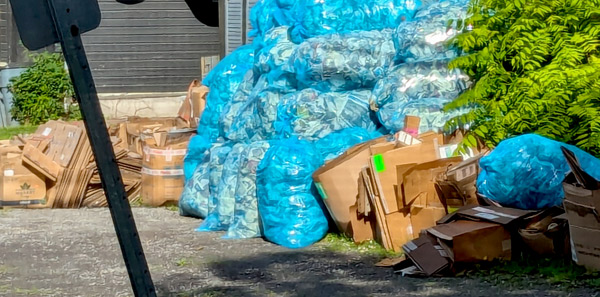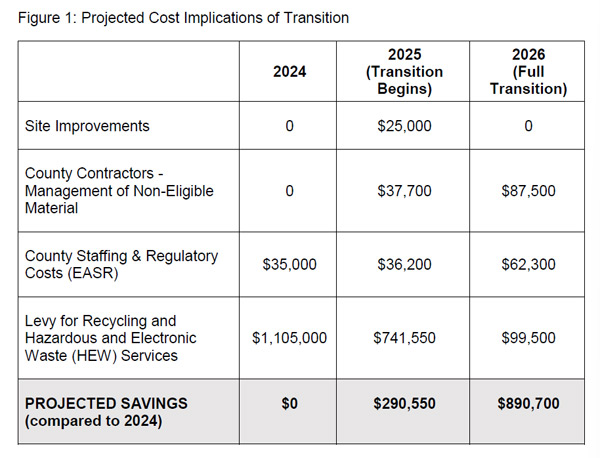Councillors expect upset as people learn business recycling pick up will end
Administrator | Sep 17, 2024 | Comments 2
More than 500 businesses and commercial operations, 36 campgrounds and 37 municipal facilities in the County will no longer have recycling picked up curbside starting next summer – having been deemed “ineligible” by the province.
And while the good news is potential savings estimated at $890,700 for the municipality, (current cost $1,105,000) the bad news is there will be upset.
The choices for those soon-to-be “ineligible” for recycling pick up will be to take it to one of the County’s waste transfer sites; take it home where recycling will still be picked up curbside, or to stop recycling altogether. Meanwhile, current statistics indicate that only about 30 per cent of Ontario’s waste actually gets recycled.
Ontario is transitioning to extended producer responsibility where the businesses that sell packaging and paper products to consumers will be financially and operationally responsible for collecting, processing and recycling those materials. Under the Resource Recovery and Circular Economy Act, 2016, Ontario’s Blue Box Regulation shifts responsibility for the Blue Box Program to the organizations that produce products and packaging. Under the old system, communities shared the costs.
“This is going to be an absolute mess,” said councillor Phil St.-Jean, who questioned how recycling outside businesses that have residences above would be separated commercial from residential. ”
“That’s a million dollar question,” answered Albert Paschkowiak, Environmental Services and Sustainability Supervisor who presented his report on the changes to Committee of the Whole, Thursday.
And while ultimately the responsibility falls to the province, St.-Jean stated concern that each and every councillors need to be prepared with provincial ministry names and phone numbers to give out “because we’re all going to get phone calls from every commercial operator in this County”, also noting that until Thursday’s by-election is over, there is no MPP to contact.
“I don’t know what to tell people. This is absolutely terrible,” said St.-Jean. “I absolutely want to see our costs reduced, and yes, we are increasing service to a point, but I can’t stress enough we are putting all the bad parts of this on the backs of those in our community who have been struggling for several years and some are still struggling…. I am not looking forward to my next BIA meeting.”
CAO Marcia Wallace added the municipality cannot control this provincial legislation, but the Minister of the Environment can and “that’s where I would direct the feedback”.
St.-Jean requested staff send each councillor contact telephone numbers and email addresses and stated he hopes people concerned will “inundate the ministry with complaints and directions. This is just not good. It’s not good policy and it leaves an important sector of our community and our economy out in the cold.”
As of Jan. 1, 2026, all municipalities in Ontario are to have transitioned to the new recycling collection model, led by the provincial government, designed to have companies that produce blue box materials fully fund and operate the recycling system.
Each community in the province is, or has been, in the process of deciding whether to continue to provide curbside collection for the soon-to-be “ineligible”.
At the meeting, councillors supported Paschkowiak’s recommendation for “a middle ground solution” to add Wednesday openings at Wellington and Sophiasburgh waste transfer sites next July (for recycling and garbage) along with continued advocacy to fix the business/commercial concerns.
The County is to begin transition from the current municipally-funded to the province’s ‘producer funded’ model on July 17, 2025 and be complete by Jan. 1, 2026.
At that time, curbside collection will be provided only to single-family homes, seasonal dwellings, multi-unit residential buildings, public and private schools, specified retirement and long-term care homes and specified public places. Commercial, industrial, institutional and municipal buildings are “ineligible” and will receive no curbside services.
Currently the County operates seven depot locations that receive recycling every Saturday, and on Wednesday in Picton only. The non-eligible material would be managed through a private contractor who would collect at each of the County’s seven waste sites as opposed to stopping at the approximately 637 non-eligible sources.
The change is more of a problem in rural areas than larger cities, explained Wallace.
“In rural communities municipalities have been taking on service that was too expensive for disparate businesses spread out, or small numbers of businesses. So we were delivering more service than you would have gotten in a city. And now, when this changes, that’s why it hurts us more than it does a city. Because we are delivering a larger amount of waste service than would have been delivered elsewhere.”
Paschowiak’s report also noted “The challenge is further exacerbated by requirements in the legislation that prevent municipalities from using the same trucks and systems used by the contractors, which increases inefficiency and the number of trucks utilizing the County’s roads.” He told council the expense for trucks would be 40 per cent of the current levy, for six per cent of the stops.
Under the provincial legislation, the Producer Responsibility Organization’s (PRO) current provider, Circular Materials Ontario (CMO), will be required to provide service to eligible sources only.
The County attempted advocacy by way of a letter to Premier Doug Ford, several ministries and associations. A response has yet to be received, however at least six other municipalities have joined the County’s effort to advocate for change.
“Many neighbouring municipalities are taking a similar position, and not taking on additional expense as a result of the provincial transition from the blue box” stated Paschkowiak in his report.
Recycling service and household hazardous waste service to everybody currently costs the County approximately $1,105,000 annually in fees to the Centre and South Hastings Waste Services Board.
He noted Loyalist Township will discontinue collection of non-eligible; the Town of Greater Napanee has opted to provide curbside collection during the transition period of six months, but not afterward. He said staff from Belleville and Quinte West are exploring costing for provision of services but no costs have been presented and no decisions made.
The recommended expansion of recycling services at the depots to offset the loss of curbside collection is estimated to cost about $37,700 in 2025 and $115,000 in 2026, with a one-time investment of $25,000 to purchase additional totes and prepare areas to accommodate more.
Staff are to present options for use of cost savings from the transition for the 2025 budget and will mount an education campaign leading up to the transition, communicating options for non-eligible sources and highlighting the cost savings for taxpayers.
Filed Under: Featured Articles • Local News
About the Author:



































It’s legislated and further local residents should not be subsidizing for profit businesses to take their recyclables.We already pay for that with a purchase.
Thank you Councillor St-Jean and others for recognizing stupidity run amuck. I’m just a lowly mathematician who reads numbers, that our County can “save” $890,700 in the year after next. That’s $44 per man, woman and child who lives here. Happiness? Or not?
What happens to “recyclables”? Today we have a small number of big blue (yellow?) trucks that drive around our County. The suggestion appears to be that we need 567 “ineligables” to drive 567 of their own trucks to “somewhere” instead of walking to the curb once a week. Let’s just say that this is a couple of litres of gas and half an hour of time to get “somewhere”. That’s 58,968 litres of gas (think CO2) per year; driving time is 14,742 hours per year. The blue or yellow truck that already drives around might be a gas-guzzler, the driver might take a few more minutes to pick up more recyclables, but mathematics (common-sense) suggests that this is non-sensical.
Then, apparently, we have to pay for “expansion of recycling” to offset the loss of curbside collection for a further $115,000 in 2026 — this expansion is presumably where the blue or yellow trucks will pick up the recyclables. Added expense, total loss.
What are our options? Buy a “burn permit”? Problem solved. The plastics might stink a bit, but you’ve saved the municipality $890,700.
We have a garbage problem in our County — think trash-bash, think Owen Jones, think the thousands of off-road places where garbage, home appliances and other semi-industrial waste is dumped daily, think soccer fields and other community spaces where people dump beer cans and fried chicken plastic boxes just a few metres away from “blue” containers. Ask yourself if this latest savings of $890,700 is going to help.
Let’s get back to our County common sense.
Paul